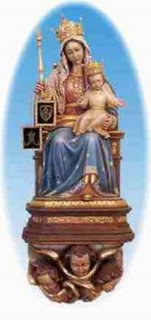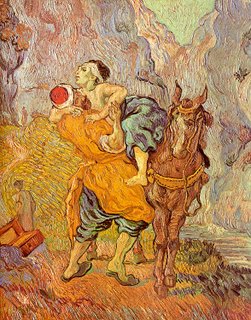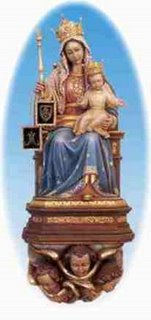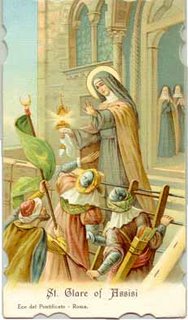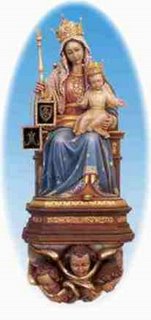 "Dark night of the soul" - St John of the Cross
"Dark night of the soul" - St John of the Cross CHAPTER XII
Of the benefits which this night causes in the soul.
THIS night and purgation of the desire, a happy one for the soul, works in it so many blessings and benefits (although to the soul, as we have said, it rather seems that blessings are being taken away from it) that, even as Abraham made a great feast when he weaned his son Isaac, even so is there joy in Heaven because God is now taking this soul from its swaddling clothes, setting it down from His arms, making it to walk upon its feet, and likewise taking from it the milk of the breast and the soft and sweet food proper to children, and making it to eat bread with crust, and to begin to enjoy the food of robust persons. This food, in these aridities and this darkness of sense, is now given to the spirit, which is dry and emptied of all the sweetness of sense. And this food is the infused contemplation whereof we have spoken.
2. This is the first and principal benefit caused by this arid and dark night of contemplation: the knowledge of oneself and of one's misery. For, besides the fact that all the favours which God grants to the soul are habitually granted to them enwrapped in this knowledge, these aridities and this emptiness of the faculties, compared with the abundance which the soul experienced aforetime and the difficulty which it finds in good works, make it recognize its own lowliness and misery, which in the time of its prosperity it was unable to see. Of this there is a good illustration in the Book of Exodus, where God, wishing to humble the children of Israel and desiring that they should know themselves, commanded them to take away and strip off the festal garments and adornments wherewith they were accustomed to adorn themselves in the Wilderness, saying: 'Now from henceforth strip yourselves of festal ornaments and put on everyday working dress, that ye may know what treatment ye deserve.' This is as though He had said: Inasmuch as the attire that ye wear, being proper to festival and rejoicing, causes you to feel less humble concerning yourselves than ye should, put off from you this attire, in order that henceforth, seeing yourselves clothed with vileness, ye may know that ye merit no more, and may know who ye are. Wherefore the soul knows the truth that it knew not at first, concerning its own misery; for, at the time when it was clad as for a festival and found in God much pleasure, consolation and support, it was somewhat more satisfied and contented, since it thought itself to some extent to be serving God. It is true that such souls may not have this idea explicitly in their minds; but some suggestion of it at least is implanted in them by the satisfaction which they find in their pleasant experiences. But, now that the soul has put on its other and working attire—that of aridity and abandonment—and now that its first lights have turned into darkness, it possesses these lights more truly in this virtue of self-knowledge, which is so excellent and so necessary, considering itself now as nothing and experiencing no satisfaction in itself; for it sees that it does nothing of itself neither can do anything. And the smallness of this self-satisfaction, together with the soul's affliction at not serving God, is considered and esteemed by God as greater than all the consolations which the soul formerly experienced and the works which it wrought, however great they were, inasmuch as they were the occasion of many imperfections and ignorances. And from this attire of aridity proceed, as from their fount and source of self-knowledge, not only the things which we have described already, but also the benefits which we shall now describe and many more which will have to be omitted.
3. In the first place, the soul learns to commune with God with more respect and more courtesy, such as a soul must ever observe in converse with the Most High. These it knew not in its prosperous times of comfort and consolation, for that comforting favour which it experienced made its craving for God somewhat bolder than was fitting, and discourteous and ill-considered. Even so did it happen to Moses, when he perceived that God was speaking to him; blinded by that pleasure and desire, without further consideration, he would have made bold to go to Him if God had not commanded him to stay and put off his shoes. By this incident we are shown the respect and discretion in detachment of desire wherewith a man is to commune with God. When Moses had obeyed in this matter, he became so discreet and so attentive that the Scripture says that not only did he not make bold to draw near to God, but that he dared not even look at Him. For, having taken off the shoes of his desires and pleasures, he became very conscious of his wretchedness in the sight of God, as befitted one about to hear the word of God. Even so likewise the preparation which God granted to Job in order that he might speak with Him consisted not in those delights and glories which Job himself reports that he was wont to have in his God, but in leaving him naked upon a dung-hill, abandoned and even persecuted by his friends, filled with anguish and bitterness, and the earth covered with worms. And then the Most High God, He that lifts up the poor man from the dunghill, was pleased to come down and speak with him there face to face, revealing to him the depths and heights of His wisdom, in a way that He had never done in the time of his prosperity. Read whole post......
